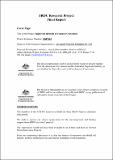| Abstract | This report explores different techniques and management principles and the results of compost production specifically for sugar-cane in tropical agriculture. Our earlier research using the Lubke Methodology developed in Austria for temperate and cold climates and reported on in GGP034 provides a background of basic compost production principles using community and sugar industry organic wastes, tractor drawn turning equipment and Lubke monitoring tools and principles. The Lubke system turns compost once weekly, more often in the first month, when CO2 content of the pile reaches 16%, but many composters claim loss of carbon and nitrogen as high as 50%, with constant turning. Some major USA composters use Static Pile composting principles to reduce turning costs and conserve nutrient losses from turning. The Ecology Action Group in the USA use 40% fresh green feed stocks to improve nutrient content because plants remobilise nutrients before foliage dies and weather continues to reduce minerals in organic mater materials. Dr Fiona Robertson in a CRC research found cane trash left on the surface looses much of its nutrition to the atmosphere as it decomposes. Hawaiian research found losses, through plant nutrient remobilisation of 30 – 50% of N, P, K and B in sugar cane leaf blade before its death. GGP062 reports on our experiences with static pile composting, our first experience of composting sugar-cane bagasse, using selected green feed stocks and a change in brix levels, i.e. greater nutritional content of vegetables grown with compost and liquid calcium, also, trials with producing the nitrogen component on-farm. A brief overview of world population trends at the end of this report implies a need for a change in agricultural practices and results, if we are to feed our population by 2100 AD. |

